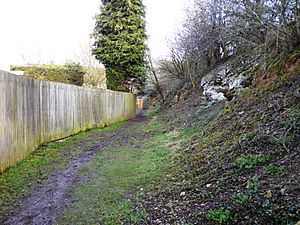Spot Lane Quarry facts for kids
| Site of Special Scientific Interest | |
 |
|
| Area of Search | Kent |
|---|---|
| Interest | Geological |
| Area | 0.1 hectares (0.25 acres) |
| Notification | 1992 |
| Location map | Magic Map |
Spot Lane Quarry is a special place in Kent, near Maidstone. It's a small area, about the size of a tennis court, that has been officially named a Site of Special Scientific Interest (SSSI). This means it's protected because it has unique geological features. It's also recognized as a Geological Conservation Review site, which highlights its importance for studying Earth's history.
Contents
Spot Lane Quarry: A Window to the Ice Age
Spot Lane Quarry is like a time capsule! It shows us what the Earth was like hundreds of thousands of years ago. The main reason it's so special is because of a type of soil found here called loess.
What is Loess?
Loess is a fine, yellowish soil that looks a bit like dust. It's formed by strong winds that pick up tiny bits of rock and minerals, often from areas that were once covered by glaciers. These winds then carry the dust far away and drop it, building up layers of loess over time.
A Glimpse into the Past: The Wolstonian Stage
The loess at Spot Lane Quarry is very old. Scientists believe it formed during a period called the Wolstonian Stage. This was a very cold time, like an ice age, that happened between 352,000 and 130,000 years ago! Imagine how long ago that was! During this time, huge sheets of ice covered much of the Earth.
Ancient Snails and Their Story
What makes the loess at Spot Lane Quarry even more amazing is that it contains fossils of land snails. Fossils are the preserved remains or traces of ancient life. Usually, loess found in Britain doesn't have many fossils. This makes Spot Lane Quarry one of the few places where scientists can study the types of animals, like snails, that lived during the Wolstonian Stage. These tiny snail fossils help us understand the climate and environment of that ancient time.
Visiting the Quarry Today
Today, Spot Lane Quarry is no longer used for digging. Instead, it has become a public footpath. This means you can walk through this historic site and imagine what it was like when giant glaciers shaped the land and ancient snails roamed the area. It's a great example of how nature's history can be preserved and enjoyed.

